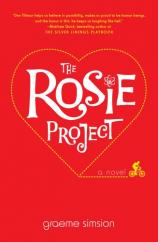Author Talk: October 11, 2013
In THE ROSIE PROJECT, Graeme Simsion introduces us to Don Tillman, a brilliant yet socially inept genetics professor. When Don decides it’s time he found a wife, he develops the “Wife Project,” a scientific study to find the idle partner. In this interview, Simsion shares how his own experience allowed him to write a character who only sees the world as “data.” He also describes the process of transforming his original screenplay into a book, and how a formulaic approach to screenwriting both helped and hindered his work.
Question: Do you have experience with Autistic people?
Graeme Simsion: I did a physics degree, worked for thirty years in information technology and taught at several universities. In these areas, technical skills are given more weight than social skills. So I met many people who I’m sure would have been diagnosed as being on the high-functioning end of the autism spectrum–had that diagnosis been common when they were younger. And I know a number of people with kids who have been diagnosed with Asperger’s Autism.
Q: What or who was your inspiration for Don?
GS: People I worked with and taught. There are plenty of Dons out there. One close friend struggled for many years to find a partner, and he provided inspiration for my first version of the story but the character and story have changed a lot since then. There is no ‘real Don’!
Q: Do you love the Museum of Natural History as much as Don does?
GS: Not that much! But it’s one of my favorite places in New York.
Q: Do you have any idiosyncratic “deal breakers” like Don with ice cream preference?
GS: I don’t think so, but I’ve been married for 24 years, so I don’t have a lot of recent dating experience (!) I really don’t like smoking, but dated a smoker for some time when I was younger. Back in those days, if I was really attracted to someone, I’d make a lot of concessions. Perhaps less so now.
Q: What’s your BMI?
GS: 22.5. I ran a marathon in 2010 and it was quite a bit less then–and even less after I ended up in hospital for a week. The story is at http://www.theage.com.au/entertainment/books/three-encounters-with-the-p...
Q: Don is a bit of a foodie. You founded Pinot Now and have eaten at El Bulli. Can you talk about the role of food and wine in your life?
GS: I’m also a bit of a foodie and a wine lover. I cook a lot, and put quite a bit of effort into meals. I actually do jog to the local market, though not on a regular a schedule as Don.
Cooking is a good opportunity for thinking (as it is for Don), and I enjoy the results. My wife and I drink a lot of wine – probably too much – and treat our travel as an opportunity to try restaurants and local produce. It’s a balance to the more intellectual business of writing.
Q: How did you develop and dive into Don’s voice?
GS: I channeled a close friend who has a background in information technology–a very technical background. In the early drafts I could hear his voice, but over time Don developed his own mannerisms. I borrowed habits like “greetings” and expressions like “human sponge mode” from other colleagues and friends.
Q: Do you feel that this is a story of triumph for Don?
GS: Absolutely. Don is the hero of the story in all senses. He sets out to do something that is a huge stretch and overcomes obstacles and his own limitations to achieve it – along the way learning some lessons about what he really needs. And he does this in a fundamentally decent way.
Q: You have a background in data modeling. What is that exactly, and did your experience with it contribute to your portrait of Don and his Wife Project?
GS: It’s basically the job of specifying a database–describing in precise technical language what data is to be held and how it is to be represented. A bit like an architect describing to a builder exactly what needs to be built, after helping the client express their requirements and proposing a design. The discipline itself doesn’t feature in the book, but some of the people I met in the field–precise, highly organized people–contributed to my characterization of Don.
Q: You also write, produce, and act in films. How is the process of writing for film different from writing a novel?
GS: Well, the acting was only one time! But I’ve produced numerous short films, and in fact wrote THE ROSIE PROJECT as a screenplay before “sideways adapting” it into a novel. In screenwriting, at least for mainstream films, there is a strong emphasis on story–and story structure. It’s more formulaic than a novel, but it’s also a good discipline. In a romantic comedy you only have about 100 minutes, so you have to make every scene count. You see it in Rosie: it’s structured as a romantic comedy, and reads as a series of scenes. And it moves along pretty quickly. In a novel, you have the opportunity to describe the character’s thought processes – and in The Rosie Project that’s an important tool for comedy. On the screen you can use physical action and timing – which are not directly available to you on the page.
Q: You own a Porsche, have solo-flown a Cessna, and walked the Camino de Santiago. Is adventure something you seek out in life?
GS: I’m not a physical thrill-seeker, but I enjoy challenges and achievement, and am very conscious that we only get one life. My wife drives the Porsche–most of the time I take the tram.




